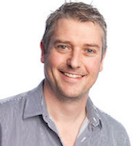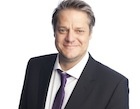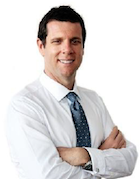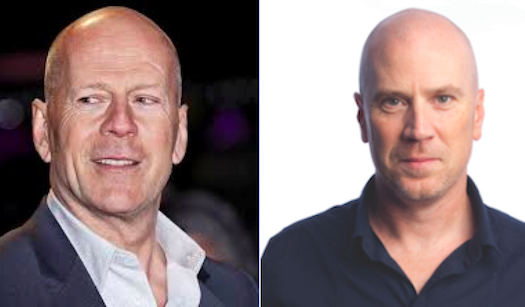If you missed it, Peter Saxon recently spent some quality time with the Bruce on the right. They work ‘em hard at SCA. When I sent Craig Bruce’s EA an email at 12:16 am on a Sunday, I didn’t expect an answer till business hours on Monday. But by 12:18 am, Kellie Shannon had responded and was busy finding a spot for me in Craig’s tight schedule.
Unsurprisingly, Craig Bruce himself has a work-life balance that’s heavily biased towards work. But for him, that’s life. As he says he’s, “Always listening.”
Not given to long dissertations, he recently summed up everything he’s learned in his 25 years in radio in a series of 25 tweets. This tweet anthology quickly became a ‘must read’ for anyone making a career for themselves on the content side of the business. In this considerably longer interview, CB, as he likes to sign his correspondence, provides some insight into the culture that drives Southern Cross Austereo.
With a regional network that stretches the length and breadth of Australia, he presides over a deep pool of talent that’s the envy of every other network. He’s not about to squander that advantage – which is why he goes to such great lengths to ensure that that talent, even in SCA’s farthest flung outposts, feels loved and part of the big picture.
In our discussion, CB tells how to get ahead at SCA and names those on the ‘watch list’ for promotion. He also tells who he’s watching at other networks and what he thinks of his competitors.
Yet, for all his passion for the industry in which he arguably holds the top Content job, his own daughters don’t listen to the radio. He tells us what they do listen to and how that augers for radio’s future.
radioinfo: Tomorrow you’ll be hosting SCA’s third annual Content Grad School. Who’ll be attending that?
 CB: We’ve invited 60 people from Cairns to Bunbury and all of the key regional markets and we’ve got people from the metros as well. Probably 60% regional, 40% metro. We invite people who are at a similar level as Content Directors, Producers, Program Directors in the regional markets. And Breakfast Hosts in the regional markets. We work with Dave Cameron and Fitzy (Mike Fitzpatrick, Triple M) and Jamie (Angel, Today) on their up and comers to identify the new talent that’s coming through.
CB: We’ve invited 60 people from Cairns to Bunbury and all of the key regional markets and we’ve got people from the metros as well. Probably 60% regional, 40% metro. We invite people who are at a similar level as Content Directors, Producers, Program Directors in the regional markets. And Breakfast Hosts in the regional markets. We work with Dave Cameron and Fitzy (Mike Fitzpatrick, Triple M) and Jamie (Angel, Today) on their up and comers to identify the new talent that’s coming through.
radioinfo: Realistically, if I’m a young jock or CD at, say, HOT FM in Charters Towers, can I be confident that someone at Head Office is actually paying attention and, if I’m really good, I’ll end up in a metro market?
CB: I would really hope that that’s what people think, working at SCA. This is the third grad school that we’ve done and they are really well received. People working in the regional markets love to get in front of our best people in the metro markets. It gives everyone a chance to go, Okay, I’m working in this market – how do I get to a metro market? Or how do I get to be as good as a Jamie Angel or a Paul Dowsley or a Dave Cameron?
When you are sitting in a room and hearing from them (the metro CDs) and hearing their back story and what it takes to be the best, it’s really inspiring.
radioinfo: Given that SCA’s networks cover such a vast territory, outside of these big get-togethers, how do you stay in touch with your farthest flung outposts?
CB: We have a lot of devices. One of them we have is a Content Hub which is a closed Facebook group. Every single person who works in Content at SCA has been invited into the Hub of which I am the sole administrator. And we use this Facebook Hub for sharing ideas and for benchmarking our talent.
Obviously, Training and Development is the big opportunity for our business because we have so many young people coming through. So, we try and keep that pathway as open as we can, making sure that every opportunity in a larger market is available to someone working in the regions.
radioinfo: It’s an organic sort of thing…
CB: Yep…
radioinfo: I guess that if you keep your voice and face in front of your immediate boss then you’ll become visible…
CB: That’s exactly it. If you’re in a smaller market and you’re not heard all the time, then you actually have to make that effort to get in front of the people who are making decisions in the key markets. Very rarely do you get to where you want to go by sitting on your laurels and waiting for it to happen. You actually have to make an effort. So, we reward those people who are putting their hands up and saying, How do I learn, what do I need to get better, what do I need to know?
radioinfo: So, who’s on top of the waiting list? I mean if Kyle falls under a bus…
CB: God forbid…
radioinfo: Who’s waiting, next batter up, to replace him?
CB: I don’t think anyone will ever replace Kyle Sandilands. He is literally irreplaceable in the same way that Triple M never replaced Doug Mulray. You can’t just replace an Eddie McGuire or a Merrick Watts or a Matty Johns. These people are unique.
 But I sent a tweet out just the other day on some amazing young females coming through at the moment – some really brilliant regional shows that we are really excited about like Kristie Mercer (left), Kristen Henry, Heidi Anderson, Dani Pola, Abby Coleman, Maz Compton… So, in terms of women on the air we have some fantastic options moving forward.
But I sent a tweet out just the other day on some amazing young females coming through at the moment – some really brilliant regional shows that we are really excited about like Kristie Mercer (left), Kristen Henry, Heidi Anderson, Dani Pola, Abby Coleman, Maz Compton… So, in terms of women on the air we have some fantastic options moving forward.
Dan Debuf is a brilliant young comedian. Michael Beveridge is outstanding, Dave Thornton, from the Mama Mia show, we’re doing quite a bit of work with – he’s a star of the future. Matty Acton is a genuine talent. Charli Robinson. We’ve got a lot!
But having said that, if the Kyle & Jack show finished up, for whatever reason, we don’t replace those shows. We have to start again and rebuild.
radioinfo: So, what’s the next step for all those names you’ve just mentioned?
CB: For most of those we look at the Adelaides, Perths and Brisbanes. And ideally we try and match talent with their home towns. It works particularly in markets like Perth and Adelaide.
Emelia ‘Em’ Rusciano was brilliant in Perth. Wippa (Michael Wipfli) was in Perth for a couple of years, Sam Mac (MacMillan) was in Perth for a couple of years. But because it’s not their home town it was never ever going to be a long term thing for us. Ideally we would like to get someone who was from Perth who would move back there and say, Well, that’s my home town. I’m happy to commit for a period of time.
radioinfo: Despite that deep gene pool in your own network, you’ve not been averse to signing talent from other networks…
CB: No, absolutely not. I appreciate good radio talent whether it’s on DMG or ARN.
radioinfo: Merrick Watts comes to mind as one of the major signing from another network.
CB: Merrick came to us probably because there was an end game for him at DMG and we were lucky to have a really obvious next phase in his career on Triple M that he has fitted really well into.
And Dan & Maz were probably as much keen to come back to Sydney and move home for a couple of different reasons and we were lucky enough to be right time right place.
radioinfo: Who else from other networks is currently on your radar?
CB: I love Chrissie Swan. I think she’s amazing. Marty, Tim & Meshel I think are a brilliant show on DMG. We’re all the same… we’re just radio people and I appreciate good communicators, whether they’re working for us or against us. And any of those great shows that we think will be able to bring an audience with them, we’re always open to talking to them. But we feel as though we have a pretty good line up, certainly in the key markets, at the minute.
radioinfo: In 2010 Austereo was named in BRW’s top 50 list of Australia’s Best Places to Work for the second year in a row. None since. But what made it such a good place to work?
 CB: That’s an excellent question Pete, and I reckon it’s not for me to answer. I can only give you my view from my own experience. I am a classic product of Austereo’s culture. I started as a mid-dawn announcer at Fox and worked around the country and had terrific mentors like Brad March, Brian Ford, Jeff Allis, and Guy Dobson (left). The company has given me so much in terms of education and training and management and leadership skills and encouragement to see how far I could take it.
CB: That’s an excellent question Pete, and I reckon it’s not for me to answer. I can only give you my view from my own experience. I am a classic product of Austereo’s culture. I started as a mid-dawn announcer at Fox and worked around the country and had terrific mentors like Brad March, Brian Ford, Jeff Allis, and Guy Dobson (left). The company has given me so much in terms of education and training and management and leadership skills and encouragement to see how far I could take it.
Today, there’s nothing more exciting for me than to see people reach their potential. That’s absolutely the start and end of it for me. For example, we’ve got a young guy at Fox – he’s not young anymore – Adrian Brine who is the Assistant Content Director at Fox. Just a brilliant story and one of a hundred in our business and probably similar to other stories in other radio businesses as well.
He started in Whyalla, moved to Adelaide to panel a couple of the late night shifts. And then we started to give him some on air work. Every single challenge that we gave him, he took and developed and got better and better and every single time that we asked him to stretch, he found a way to reach. And over a very short period of time, 3-5 years, he is now the Assistant Content Director of Fox and will one day be the Content Director at one of our stations.
I think that’s what good companies do. They identify people with potential and they bring them through. That’s the Austereo culture for me. Part of the reason for the Grad School is to say, Here are the people that you’re going to hear from on stage today. They are really good at what they do, but one day they were sitting where you are today. So, what is it going to take for you to be that next generation?
That’s the thing that’s exciting for me.
radioinfo: As far as I am aware, the term ‘work-life balance’ has never really caught the imagination of the radio industry. I understand you work your people very hard – what network doesn’t – but is it fair to say that if you’re not willing to devote your life to radio, you shouldn’t be in it?
CB: I would like to think it is not as cut and dried as that. Ideally anyone working on one of our product teams in one of our key markets loves radio… or loves the process of making Content.
We care about the work that’s done and the end result. We care about engagement. I don’t think its about hours any more. I really don’t. It’s about effort. Radio is one of those jobs where you can turn a career out of a hobby .
I’m with guys who are my age – the Jamie Angels and the Mike Fitzpatricks and Derek Bargwannas and Dave Camerons – they’ve got young families and they leave at 3 or 4 o’clock on Thursday and Friday afternoon to pick up the kids from school. They might start late. I don’t have a stop watch on any single one of our people.
radioinfo: Do you ever switch off? The radio?
CB: Umm, rarely. It doesn’t feel like a burden that I don’t switch off. I just love it.
Essentially, any free time I have, if I’m at home walking the dogs or, if I’m not with my wife and kids, I’m thinking about work. That’s been the case for about 15 years. And you know what? I am the luckiest person in the world to have a job like this. Seriously. And there’s not a second when I don’t appreciate that.
radioinfo: You never get into the car and not listen to radio… put on your own CDs…?
CB: I’ll listen to the ABC on the weekends, just to …
radioinfo: Like that’s not radio?
CB: I mean, I might not listen to our stations for a period of time. I might just grab the news on the ABC.
radioinfo: So, that’s as far as you go, you’ll listen to other stations but you wouldn’t think of putting on an iPod or something?
CB: No. That’s been a way of life for me. Always listening.
 radioinfo: I spoke to Nick Randall (left) recently, who left SCA earlier this year, and followed Adam Lang to Fairfax. I asked him whether the culture at Fairfax is very different to what he knew at SCA. He told me, “Austereo has a great culture. It’s very much about winning and creating great work….”
radioinfo: I spoke to Nick Randall (left) recently, who left SCA earlier this year, and followed Adam Lang to Fairfax. I asked him whether the culture at Fairfax is very different to what he knew at SCA. He told me, “Austereo has a great culture. It’s very much about winning and creating great work….”
CB: We normally set really high benchmarks in terms of quality control. We expect people to genuinely care about the product and to be actively involved in making it better. And at the heart of it, if we’re going to continue to win over the years ahead, it will about whether we have great people – that’s really the difference.
Do I think we have better people than ARN and DMG? I think we’ve got great people. I’m sure they have as well. But I focus on bringing through the next generation and also giving the current team all the tools they need to win. It really is a people first strategy I think.
radioinfo: Nick Randall also said: There’s a definite belief at SCA that they are number one and that they lead Australian radio – that they wrote the book on radio and no one contributed to any of the chapters. Not even a footnote. Would you agree with that?
CB: No I wouldn’t . I have a massive issue with being perceived to be arrogant. He can have that opinion, but I actually think that the Nova launch – the original Nova launch from 10 years ago – was one of the great brand launches of the last 20 years of any entertainment brand. I think what they did coming into the market and really just turning the industry upside down was a brilliant strategy, and I have a huge amount of respect for the people who put that together. They taught us a lot through that period of time.
I have a huge amount of respect for Duncan Campbell and what he’s done with MIX and GOLD. We can’t get around them in Adelaide. There’s an amazing run of success in Adelaide with the MIX format. And they’re having success in Melbourne and Sydney at the moment as well.
I have a huge amount of respect for Paul Jackson and what he has done with smooth. It was pretty obvious to everyone that they needed to move to that format, but they’ve done it and executed it brilliantly. And he’s been courageous around some of the changes he’s made with Nova in terms of their music positioning.
No, I have massive respect for a lot of what our opponents do.
radioinfo: But isn’t it hard not to be perceived as arrogant if you are number one and have a culture of winning?
CB: I don’t tell our teams – any show, any team – that the end goal has to be number one. I mean, you’ve got to have steps to get there. If it’s just about numbers on a page, well, what does that mean to anyone producing a product? It has to be about the process of creating Content, building the teams, getting the environment right. All of the steps around that which I think is important and then the end result will take care of itself.
So #1, #2, #3, it depends on the cycles of shows. For example, we have a great show in Adelaide that will eventually do well on SAFM but it’s not even close to being in the game at the moment. That’s because it’s only six months old. So, let’s talk about that in 18 months from now and see where it’s at. But I think its completely unhelpful having a ‘we must be Number One’ strategy. The question behind the strategy is ‘what does it take for us to be number one?’ That’s our conversation.
radioinfo: There are an awful lot of challenges that radio is facing at the moment. The value of the broadcast licence which protected the industry’s exclusivity is rapidly diminishing. It won’t be long before the internet is available in cars and music streaming services, like Pandora, that call themselves radio will be there too. How do you see it ending up?
CB: Find me an industry that isn’t going through disruption- that’s just the way of the world. We all have to suck that up. We’re not different to any other business from retail to finance.
All I know is that – and I talked about it at the European conference a couple of months ago – I’ve got two 18 year old daughters who have never ever woken up with the radio next to them on their bedside tables. When they get home from school they don’t listen to the radio like I used to when I would come home and do my homework. And when they finish dinner and go up to their bedrooms the radio isn’t playing when they’re doing their homework, like I used to listen to the HOT 30, or whatever show it was in Adelaide at the time.
radioinfo: What do your daughters wake up to?
CB: They wake up to their phone, and they’ll watch 15 minutes of Nickelodeon or Sunrise or whatever. They’ll get some radio in the car on the way to school or uni, depending on where I am sending them. And they’ll YouTube their favourite songs. That’s essentially how they access music
My two 18 year-old daughters in seven years from now are going to be in the 25-39 buying demo which is not too far away.
radioinfo: That’s quite an ominous sign, isn’t it, when the Head of Content’s own daughters hardly listen to radio?
CB: The only thing that I think separates radio from Pandora is people.
When Hamish & Andy were coming to town, my daughters were at me at a million miles an hour: How can I meet them? Can I get an autograph? So unique talent – talent that connects – is, without question, our only defensive wall to be honest. It’s the only way for us to stay relevant. Sure, the music’s critical and the contesting and the brand and the whole experience. But it has to be about finding people that can connect with listeners. And that’s the only thing to me that matters.
There was a great quote from Doug Morris, the CEO of Sony Music in America recently. He’s been in the industry for 50 years. He’s seen every single music revolution from Elvis to The Beatles from The Sex Pistols to Disco to Grunge. And he said that the music industry has not changed a bit from when he started in 1950 odd. He said that the only thing that matters is finding a hit. You’ve got to find the next hit record. And for me, if I had to prioritise my job, the only thing that this company expects me to do is find the next hit show whatever that show might be.

Peter Saxon


Firstly, Hot FM Charters Towers? No talent there – never has been, probably never will be. It’s nothing more than a sales office.
SCA simply don’t make any effort to broadcast locally from their inland Hot FM stations in Queensland. Instead, they all take generically produced breakfast and morning programming from jocks in Townsville.
Opportunities for young jocks at these Hot FM stations are non-existent. For Craig Bruce not to acknowledge that speaks volumes.
Secondly, I believe opportunities for on air talent in SCA’s regional network are actually decreasing. For instance, Sea FM in Rockhampton which up until recent years enjoyed a strong ‘live and local’ branding, now only has one local non-breakfast shift. (9am – 12pm).
The 1pm – 5pm shift could easily be filled locally with a young up and comer, as it has been in the past. But instead, it’s now lazily voice tracked in Townsville by a veteran announcer who’s been in radio for many years.
Weekends also now mainly consist of the generic ‘Greatest Hits’ network feed from the Gold Coast.
Instead of sustaining opportunities for young jocks to cut their teeth on local stations, it's becoming more evident to me that SCA are taking the inexcusable ‘can’t be bothered’ approach at the regional stations, and are actually taking away opportunities in regional areas.